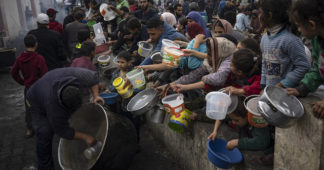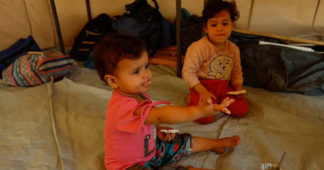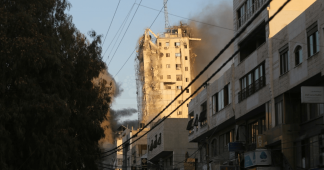By Andre Damon
Dec 22, 2023
The death toll of Israel’s genocide in Gaza reached 20,057, according to a statement Friday by Gaza’s Ministry of Health. Taking into account the 7,000 missing, most buried under rubble, the true death toll has likely already exceeded 25,000.
A death toll of 20,000–25,000 out of a population of just over 2 million means that more than one out of 100 people in Gaza has been killed in the past two-and-a-half months. This is the equivalent of 3.3 million people in the United States.
The Health Ministry said over 50,000 people are wounded, of whom 5,000 are in critical condition and risk death unless they are transferred abroad for treatment.
Ashraf Al-Qudra, a spokesman for the Health Ministry, said that 50,000 pregnant women and about 900,000 children are suffering from malnutrition. He said that just one-fiftieth of the required aid is traveling into Gaza.
On Thursday, the United Nations reported that a quarter of Gaza’s population, or over 500,000 people, is starving. “Hunger is ravaging Gaza, and this is expected to increase illness across the Strip, most acutely among children, pregnant and breastfeeding women, and older people,” the UN wrote in its report.
The UN reported that 93 percent of the population is facing “crisis levels of hunger,” while one in four households is facing “catastrophic conditions” of starvation. It concluded, “Starvation, destitution and death are evident.”
According to the UN, “WHO staff say that every single person they spoke to in Gaza is hungry.” They added, “We move around Gaza delivering medical supplies and people rush to our trucks hoping it’s food.”
There have been over 100,000 cases of diarrhea reported, with half among children under five years old, a rate 25 times greater than what existed prior to Israel’s onslaught.
The UN noted that “while a healthy body can more easily fight off these diseases, a wasted and weakened body will struggle. Hunger weakens the body’s defences and opens the door to disease.” The report noted that “in Gaza today, on average, there is only one shower for every 4,500 people and one toilet for every 220,” and “these conditions make the spread of infectious diseases inevitable.”
In a staggering statement to the AP, Arif Husain, Chief Economist and Director of Research, Assessment and Monitoring at the United Nations World Food Programme, implied that the mass starvation in Gaza is the worst he has seen in his lifetime. “It doesn’t get any worse,” he said. “I have never seen something at the scale that is happening in Gaza. And at this speed.”
Some 1.9 million residents of Gaza, or approximately 80 percent of the population, are displaced. There are no functioning hospitals in northern Gaza, and only nine health facilities in the whole country remained partially functional.
On Friday, the United Nations Security Council adopted a resolution calling for humanitarian aid to be allowed into Gaza. Over the past two months, the United States has vetoed two UN Security Council resolutions calling for a ceasefire. This time, the United States abstained, after all language calling for a ceasefire was removed from the draft, and instead called for “for creating the conditions for a sustainable cessation of hostilities.” Negotiations over finding language that the US would not veto dragged the vote back from Monday to Friday.
Earlier language calling for “the urgent suspension of hostilities to allow safe and unhindered humanitarian access, and for urgent steps towards a sustainable cessation of hostilities” was removed to prevent the US from vetoing it. A proposal by Russia calling for an “urgent and sustainable cessation of hostilities” was vetoed by the United States, despite receiving 10 out of 14 votes in favor.
Russia’s UN Ambassador Vassily Nebenzia accused the United States of “forcing into the text an essential license for Israel to kill Palestinian civilians in Gaza under the pretext of ‘creating conditions for a cessation of hostilities.’”
On Friday, UN Secretary General Antonio Guterres said the way Israel is conducting its operation is “creating massive obstacles to the distribution of humanitarian assistance” in Gaza. Guterres said that “four out of five of the hungriest people anywhere in the world are in Gaza.”
“The failure to call for a ceasefire after five days of deliberate delays and dilutions of the resolution is incomprehensible and utterly callous,” said Sally Abi-Khalil, a spokesman for the Oxfam charity. “It is a profound dereliction of duty from an organization established to uphold the UN Charter to maintain peace and protect lives.
“It actively denies over two million Palestinians—many of whom are now starving as a risk of famine looms—respite from the relentless bombardment and siege they have endured for nearly two and a half months.”
Christopher Gunness, the former chief spokesperson for the United Nations Relief and Works Agency for Palestine Refugees in the Near East (UNRWA), accused the UNSC resolution of “greenlighting genocide” in a statement to Al Jazeera. Gunness said the massacre in Gaza is “an American-Israeli genocide—it’s not just an Israeli genocide.”
“Just as America provides Israel with $4 billion of military support per annum, it’s also—as we’ve seen tonight—providing Israel with diplomatic and political cover to continue with a genocide which is marked by the wholesale and industrial ignoring of international humanitarian law,” Gunness told Al Jazeera.
Gunness is correct. In a press briefing on Wednesday, US Secretary of State Blinken was asked to comment on the world seeing Israel’s onslaught on Gaza as “America’s war.” Blinken did not object to this characterization, instead declaring that the US government is “intent on seeing this through to completion.”











